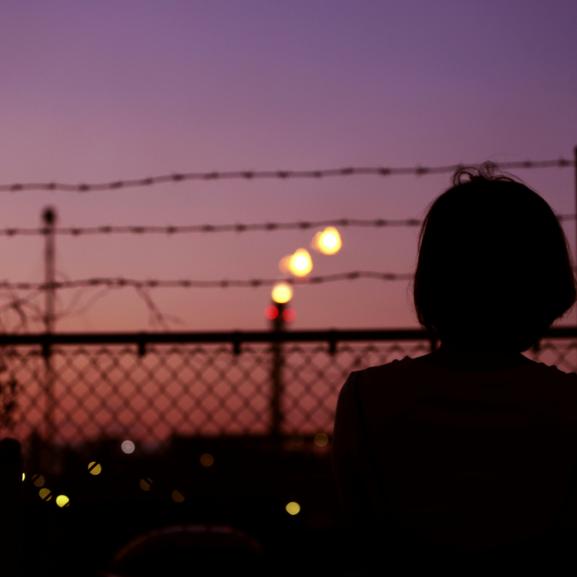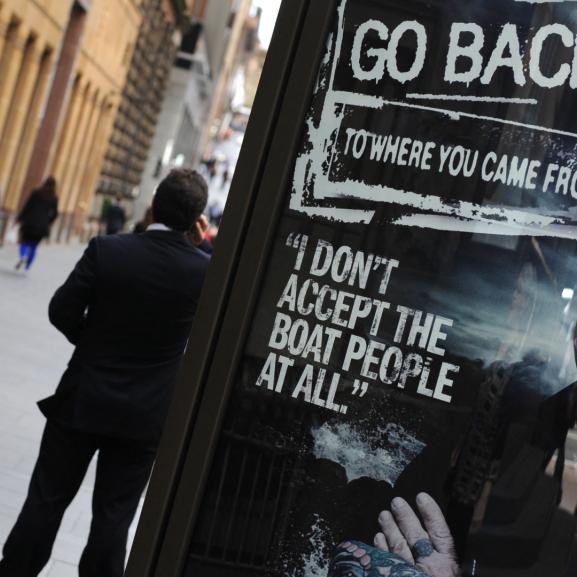"Can we really create change?" - blog by our policy director
Blog by Steve Crawshaw, Director of Policy and Advocacy
On a subject as tough as torture, we are often asked: can we really create change?
The ultimate vision of Freedom from Torture is to end all torture. Yes, we know – that one’s a bit of a stretch, at least in the short term. Also, the shameful comments by Home Secretary Sajid Javid, with regard to those who flee Iran and risk their lives to reach the UK, remind us that we still have tough mountains to climb, in terms of helping those who seek refuge on these shores. (Despite what the Home Secretary says, a request for safety can never in itself be illegal.)
But one of the inspiring things about working with Freedom from Torture is that we are able to create change, even in the toughest circumstances. Much of Freedom from Torture’s work is on rehabilitation, directly supporting people who have been tortured to rebuild their lives. These stories inspire all of us, every day. However, we also pride ourselves in changing policies, persuading politicians and policymakers to change their minds and to allow the light of humanity in.
Shameful comments by Home Secretary Sajid Javid, with regard to those who flee Iran and risk their lives to reach the UK, remind us that we still have tough mountains to climb.
Thus, for example: together with our supporters and survivors of torture, we have managed to persuade the government to improve the way medical evidence is treated when assessing the asylum claims of torture survivors.
Even with a Home Office wedded to its “hostile environment”, in 2019 we expect to see the culmination of several years’ work. Asylum caseworkers will now get specialist training on how to deal with medical reports of torture. We hope this marks a move away from a situation where the default was often to disbelieve people who have survived torture, even when telling their own, expertly documented stories.
We cannot declare victory yet, of course. Even if the civil servants tasked with running the training have the best intentions, they need humane political direction. Not least because of the toxic rhetoric that we heard in recent weeks, I remain unconvinced that the notorious hostile environment is now part of history. Practical evidence suggests little has been done to dismantle the systems and laws that turn public sector workers into border guards or which brands detention as an “administrative convenience”. Nevertheless, the willingness to introduce the new training is an important step forward.
Practical evidence suggests little has been done to dismantle the systems and laws that turn public sector workers into border guards or which brands detention as an “administrative convenience”.
In our global work, too, we regularly gain victories. The Foreign and Commonwealth Office reported that our previous report on the Democratic Republic of Congo led to spot checks on detention facilities and the closure of torture sites in the country. There, too, however, the battles are far from over, as recent events have made clear. Our report A Tool to Silence: Torture to Crush Dissent in the Democratic Republic of Congo featuring the voices of torture survivors themselves at the heart of the report, got strong media pickup, but more work is needed before we get change. In the meantime, we are pleased that the Home Office changed its country information note on Congo in light of our findings, but there is more to be done.
Following controversial elections in December and the ongoing arguments about the results, we are determined that the international community must keep up the pressure on Kinshasa. Congo is a key source of minerals – in laptops, in electric cars, and more. Billion-dollar global deals are par for the course. But that can’t be a reason to ignore the brutality of those who torture people for the mere crime of wearing a T-shirt with the wrong slogan, or helping others to understand their basic rights. That will be as true for President Tshisekedi as it was for President Kabila.
We are pleased that the Home Office changed its country information note on Congo in light of our findings, but there is more to be done.
In Sri Lanka, our work detailing torture has also had impact. Our landmark report Tainted Peace looked at the ongoing torture after the end of the long and bitter conflict, when tens of thousands of civilians were killed in just a few months in Sri Lanka’s official “no fire zone” in 2009. The power of that report, and the voices of Freedom from Torture supporters who spoke out on those themes, got people identified as at risk of torture off charter planes back to Sri Lanka and had a significant impact on the Home Office policy of mass removals at that time. Mahinda Rajapaksa was president of Sri Lanka at that time. In recent months, he tried to install himself back in power, this time as prime minister. In a recent article for the Observer, Freedom from Torture made clear how great the dangers of that would be. We were glad that the All-Party Parliamentary Group on Human Rights highlighted our concerns. Meanwhile, we have called on the government to halt forced removals of Sri Lankans from the UK while the political situation remains volatile, and opposition parties have already picked up on that demand.
I have often been struck by how the pessimists in the world like to proclaim themselves as 'realists'... They are wrong.
I have often been struck by how the pessimists in the world like to proclaim themselves as 'realists'. They believe they can just sit back and do nothing, because 'nothing will change'. They are wrong, as history has repeatedly shown.
On the contrary, it is those who believe in the possibilities of change, and who act on that belief, who help pave the way for a better world. Your voices, as part of our campaigns -- through actions ranging from writing letters to signing petitions, public protests and meeting with members of parliament -- help us do that.
I am proud to work for an organisation where the voices of torture survivors play such an important role, backed by energised supporters whose actions bring the impossible within our grasp. If you don’t already subscribe to our mailing list, please do. Become part of the movement. We know we will have more fights on our hands in the coming year. We also know we can have an impact for torture survivors across the globe with your help.
So, in answer to my question: can we really create change? Yes, absolutely. Yes, we can.
So, in answer to my question: can we really create change? Yes, absolutely. Yes, we can.







